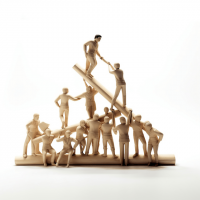How Is Your Tribe?

When a good team comes together, it’s magical. One of the best books I’ve read about software teams is Peopleware by Tom DeMarco and Tim Lister. It’s a collection of stories and lessons that the authors learned themselves and/or gathered from others over years managing technology projects. I won’t spoil the lovely surprises and insights that book provides here. When I recommend it to others, I summarize it like this:
“If you are fortunate, you have experienced the magic that is a great team coming together to accomplish something meaningful. We all want to know the recipe for doing that consistently… and no one has discovered the algorithm to accomplish that miracle. But if you want to know how to assure that a team NEVER comes together, this book is full of ideas (and recommendations about how to avoid them).”
In my 45-year career, I’ve been honored to be a member of several excellent teams. I was an Army Ranger, the junior member of a crack systems programming team, part of a startup that did amazing quality development work, senior member of a team developing and implementing cutting edge technology, and a member of several project review/audit teams that needed to determine how multi-hundred-million-dollar projects had gone off the rails and whether they could be salvaged. While I don’t have the secret formula for building the perfect team either, I do have some observations to share.
I would characterize the best teams I’ve been on as close knit “tribes”. Groups of people who work together well, trust one another, care about one another, and believe in what they are doing.
Reflecting on the best teams I’ve experienced; several attributes seem essential:
- Diverse life experiences – Every job you have and every challenge you face has an impact on who you are and how you look at problems. Good teams benefit from the different perspectives and life experiences of their members.
- Diverse skills – They may have similar job descriptions, but humans are not interchangeable parts. People have strengths and weaknesses. When teams know who is best at user interface design, or tricky algorithms, or developing test cases, or performance tweaking (and are comfortable asking for help) the consequence is that the whole group is smarter and more effective.
- Disagreement without being disagreeable – Management books often portray conflict as something to be feared and avoided. Teams comfortable exploring disagreements to determine their source often can move through the disagreement to find better solutions while also strengthening the bonds of the team.
- Sense of humor – I’ve never seen a successful team that couldn’t laugh together. Levity helps people work through stressful situations. Good-natured teasing can be an expression of friendship and love.
- Trust – The bedrock of every effective team I’ve been on was trust. Trusting people to do what they say they will and owning it when they cannot. Trusting that people will be honest about the difference between what they know and what they believe. In a trusting environment, it’s safe to ask, “What did you see or experience that causes you to believe that?”
- Generous – The best teams are characterized by members giving freely of their time and enthusiasm and knowledge.
Building an environment that develops and rewards these characteristics is challenging. There is no one-size-fits-all approach. If you recognize a deficit in one or more of these areas, you really have two viable choices—try to figure out how to address it or go find a different tribe. I have never seen ignoring a deficit result in success.


A good team is and the truth let to success, but there are always internal difficulties because of which it and breaks up, but can overcome these difficulties or not depends only on the communication within and on the specific people whether they can make concessions or not.